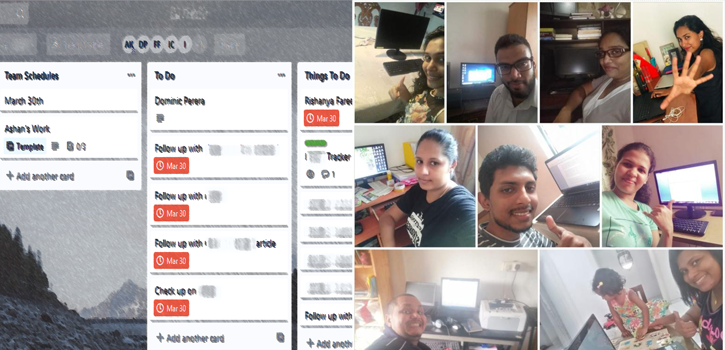
By Shonel Perera
Empathy is the most valuable asset any business leader can procure during a global pandemic. Express vulnerability and accept the situation at hand. Keep in mind that no one across the globe could have foreseen a catastrophe as such.
Below are a list that you might need to keep a check on:
- Make your schedules flexible
Make sure you allocate specific work to your employees but also keep in mind that things will not always go according to plan at this juncture. Dealing with a pandemic comes with restrictions, limitations and conflicts which you cannot always resolve as quickly as you may want to.
Exercise as much flexibility as possible with your employees’ schedules. Employees are dealing with health concerns, their children at home full time, new restrictions and difficulties on grocery shopping and a multitude of priorities and disruptions. Supporting your team may also mean having additional flexibility in your own schedule and routines. - Set new boundaries on working hours
While being flexible, also set certain working hours. The regular 9-5 just won’t cut it. With employees figuring out their groceries, family necessities like medical and other miscellaneous needs your regular hours will be difficult to cope with. Communicate and mark down flexible hours for employees with those issues and set up alternate hours as well.
While some carry out a regular 9-5, others may be willing to carry out their work from dusk till dawn. The situation evolves each day and the duration of the situation will be unknown for the foreseeable future, so do assist your fellow employees in establishing sustainable routines.
Certain districts in Sri Lanka have not yet seen curfews relaxed in a few weeks and most employees may struggle with covering their essential needs. Understand this and practice empathy and new boundaries. - Normalize the situation
As the fine line between personal lives and professional lives have been disrupted, the notion of separating the two lifestyles goes out the window. So accept it and evolve from it. You should expect hindrances from your employees as their attempt to transform their home environment into temporary office spaces comes with a multitude distractions from the hoousehold. It’s normal, it’s human.
The use of video conferencing is becoming largely popular in both professional and personal lives.
Use it to your advantage, but let your team know that it’s okay if they aren’t dressed in their business casual best or if their visible workspaces show signs of a normal humanoid existence.
Model this by letting them see some of your authentic at-home self, including family members, pets, and lived-in living spaces.
- Meet more frequently
In a time of crisis, make sure your communication is more frequent than normal. It doesn’t necessarily have to be only work related. For empathetic leaders, this mean to check in with your team out of curiosity for their health as well, make conversation and keep in contact.
Even if you don’t have any major work related activities going on, consider adding a 15-minute daily video call session where employees speak for a few minutes each and cover what they did and give out their personal ideas on how to make the situation better and easy to cope with. In addition, try meeting employees one-on-one with no set agenda on a “virtual tea talk” session. - Your ears are your most important tool right now
When speaking to your employees, do listen more than you speak at this point, let them know you see them as much more than just a working tool. Let them know you are listening to them and care about their health and well-being.
Ask how they and their families are doing and give them time to talk about whatever is on their minds. If they are parents, acknowledge the difficulty of the constant child care activities as well. - Keep yourself informed constantly
Speculating things can be damaging during this time. Clarity and guidance should come through you as your team looks to you as their leader.
A recent article showed the value of being the new form of CEO – Chief Empathy Officer. Do research and be informed on important topics for your business and team including (but not limited to) the coronavirus.
Share valuable but credible (ALWAYS check your sources) information with your team.
Many global business leaders are incorporating the “leaders eat last” approach as well. CEO’s must not attempt in assisting employees to carry out work oblivious to the situation. Leaders need to practice empathy and serve the additional needs that come about such as emotional needs of their employees, through actions and words.










